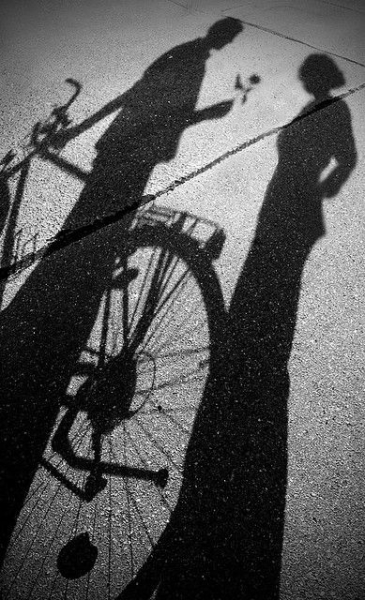By Tammy T. Stone
I’ve been thinking a lot about right livelihood after reading Ty Phillips’ inspiring article about the topic.
It’s true that we have to make a living, ideally in a way that doesn’t compromise our values and doesn’t cause harm to others.
For most of us, isn’t it hard to get past the “have to make a living part?” Time seems to slip away as we clock the hours earning our keep and staying afloat.
I don’t pretend to have any answers that don’t border on overly Utopian, but this has been weighing on me.
Since moving to Japan about a year and a half ago, the vast majority of my living has been earned proofreading and doing various kinds of English instruction, a direction I settled into more out of circumstance than a higher sense of purpose. I’d been planning and working toward doing energy healing and working with others using expressive arts, but this has proven challenging so far in this country.
I’ve been wondering if my work is right or enough, or even perfect for this phase in an ever-changing life.
I just found out that His Holiness the Dalai Lama is in Japan now. I had no idea, until I stumbled on an article covering a lecture he recently gave to university students. One of them asked him how to live most meaningfully, and he answered:
“You young Japanese should make more effort to learn English, which would serve you well. I find even my broken English is very useful. I challenge you to learn to speak better than me. And you should consider spending some time volunteering in different parts of the world. With your help many people in Africa and Asia could make their own contribution to the good of the world.”
I burst into tears immediately at the proximity of the Dalai Lama just when I’ve been pining to be in Dharamsala, where I’ve spent so many recent spring seasons, and because his assertion that English will help Japanese youth open their minds and hearts in the years to come. It felt like a heart-laced sign pointing like an arrow right to the depths of my being: you are making a contribution.
I am always struck not only by the Dalai Lama’s continued, unwavering mission to spread the word about compassion and the importance of serving others, but by the practical nature of his advice, so finely-tuned to his immediate audience (the Japanese can be very shy about interacting with foreigners).
His message: when you travel, you can learn from, and teach others; you can make a difference; by speaking a global language, you can broaden the reach of your service.
I am here, in Japan, too. This advice was also meant to find me. I can also be shy and insular if left to my natural tendencies. If I learn Japanese, I can both learn and teach better. I can enter into more meaningful dialogue and expand my sense of community, instead of accepting my “apartness” as a given.
Until I know how exactly I can work to benefit others, with natural ease—in what context, country, capacity—it soothes me to remember that the real, honest-to-goodness work is always kindness.
It is increasingly clear every day that the world needs not our (often) mindless efforts oriented toward the bottom dollar or escapism, but a much more compassion-based participation in our local and global communities.
And if we don’t know how to get from zero to sixty right away, we can remember that every single moment of the day is a moment when we can make a mindful choice.
Every morning, I try to remember my dreams because I want to know what is eating away at me during the day that gets left behind, and gets in the way of my ability to be in the world with a clear mind and light heart. Then I see the sun glinting overhead through the window and I salute it, and express gratitude for the chance at a new day. I sit on my cushion, close my eyes, welcome the quiet and observe my body and breath as they settle into their own rhythm.
Doing these things creates an opening from which softness can emerge; they are like an investment in the day (though I can’t always do them with joy, or mindfulness, or at all). I always try to remember that the real work is trying my best to put a kind energy into the world, to not say or do anything to cause harm, directly or indirectly.
We can easily become complacent about the need to cultivate compassion, as though we assume it’s a natural skill we can drum up at will. Like anything else, though, it takes real work, and like all real work, we have to be active and diligent in making it happen.
Until we get there, and until the time when the world community can sustain itself in a compassion-based mode of living, in which passions are cultivated, joy is prioritized, bodies are fed and cared for, hearts are nourished and conflict is obliterated, we can at least apply our ideals in small, practical and incremental ways, building on a sense of purpose and investing our efforts into our communities, with the best of intentions.
“We are social animals who need friends. We need a community to survive. Friends are made on the basis of trust and trust only grows if you are kind to people. Exploiting, cheating and bullying others will win you no friends. Kindness and compassion gives rise to self-confidence, which in turn empowers you to be honest, truthful and transparent. This self-confidence brings peace of mind, which also favours good health. A truthful, compassionate attitude is a sign of strength.” ~ The Dalai Lama, Japan, 2015
Tammy T. Stone is a Canadian writer, photographer and chronicler of life as it passes through us. Always a wanderer, she’s endlessly mesmerized by people, places and everything in between; the world is somehow so vast and so small. She feels so lucky to have been able to work, learn, live and travel far and wide, writing, photographing and wellness-practicing along the way. She invites you to see some of her recent photography here and to connect with her on her writer’s page, Twitter and her blog, There’s No War in World, here.
Photo: (source)
Editor: Dana Gornall
Comments
- The Importance of Connection: This is How We Heal - January 29, 2021
- Let’s Remember Who We Are - January 10, 2021
- Why the Lotus Blooms: Choosing to Stand Tall {Book Review} - October 14, 2020





